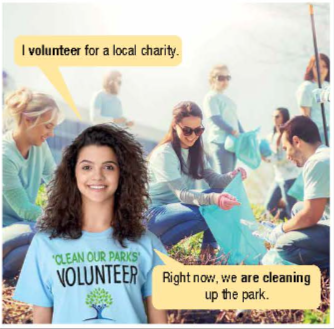a. Listen and repeat. (Nghe và lặp lại.)

Yesterday, someone stole my wallet while I was waiting for the train. (Hôm qua, ai đó đã lấy trộm ví của tôi khi tôi đang đợi tàu.)
Past Simple and Past Continuous with when (Quá khứ đơn và Quá khứ tiếp diễn với when)
Meaning and Use (Ý nghĩa và Cách sử dụng) We can use when to introduce an interruption to a past continuous action. We can use a sentence with when to start an interesting story. (Chúng ta có thể sử dụng when để đề cập sự gián đoạn của một hành động liên tục trong quá khứ. Chúng ta có thể sử dụng một câu với thời điểm bắt đầu một câu chuyện thú vị.) We were driving to the beach when our car broke down. (Chúng tôi đang lái xe đến bãi biển thì xe của chúng tôi bị hỏng.) |
Form (Cấu trúc) I/He/She was talking on the phone when a monkey stole my/his/her bag. (Tôi/Anh ấy/Cô ấy đang nói chuyện điện thoại thì một con khỉ lấy trộm túi xách của tôi/anh ấy/cô ấy.) What were you/they doing when you/they saw that? (Bạn/họ đã làm gì khi bạn/họ thấy điều đó?) |
Past Simple and Past Continuous with while (Quá khứ đơn và Quá khứ tiếp diễn với while)
Meaning and Use (Ý nghĩa và Cách sử dụng) We can use while to continue a story where the time period is important. We don't begin a story with while. (Chúng ta có thể sử dụng while để tiếp tục một câu chuyện trong đó khoảng thời gian là quan trọng. Chúng ta không bắt đầu câu chuyện bằng while.) (We went to the beach.) While I was swimming, it started to rain. ((Chúng tôi đã đi đến bãi biển.) Trong khi tôi đang bơi, trời bắt đầu mưa.) |
Form (Cấu trúc) I/He/She decided to drive there. While l/he/she was driving, the car broke down. (Tôi/Anh ấy/Cô ấy quyết định lái xe đến đó. Trong khi tôi/anh ấy/cô ấy đang lái xe, chiếc xe bị hỏng.) We/They went for a walk. While we/they were walking along the beach, we/they saw a dolphin! (Chúng tôi/Họ đã đi dạo. Trong khi chúng tôi/họ đi dạo dọc theo bãi biển, chúng tôi họ đã nhìn thấy một con cá heo!) |




